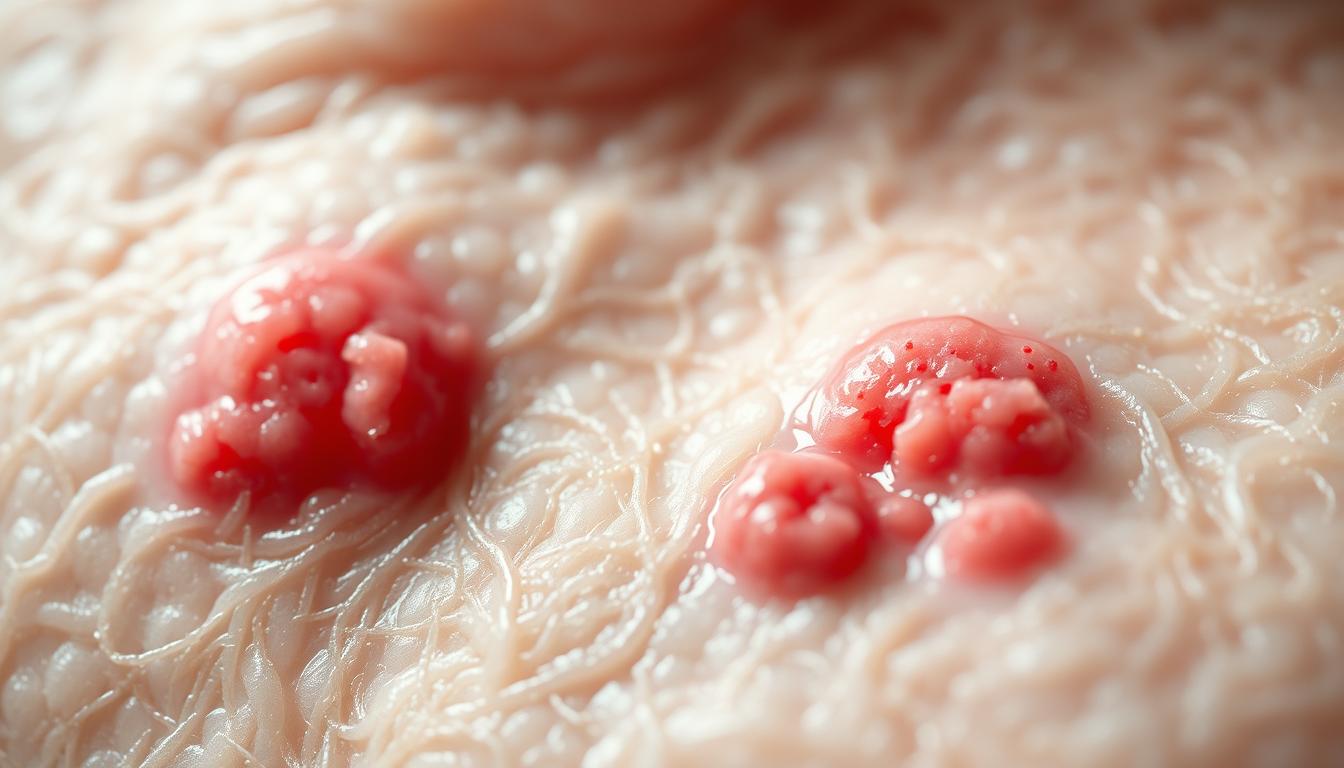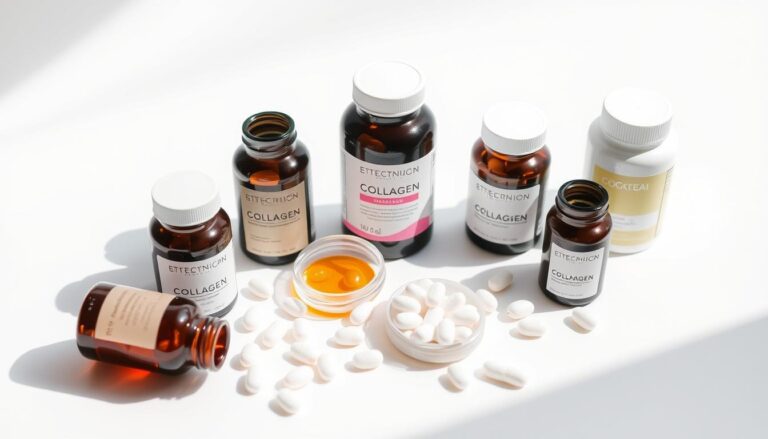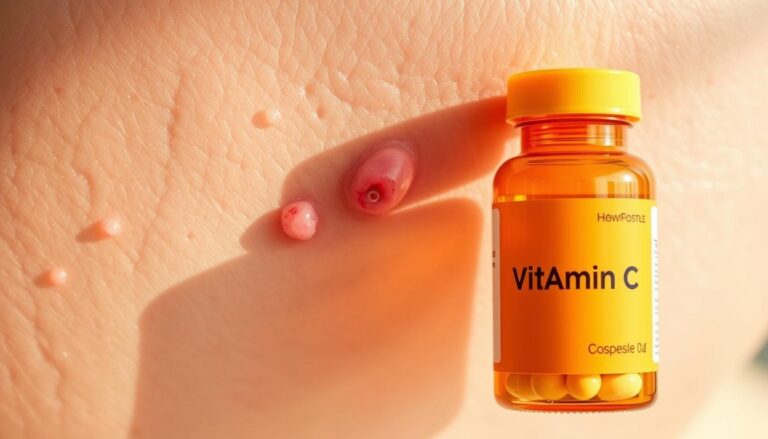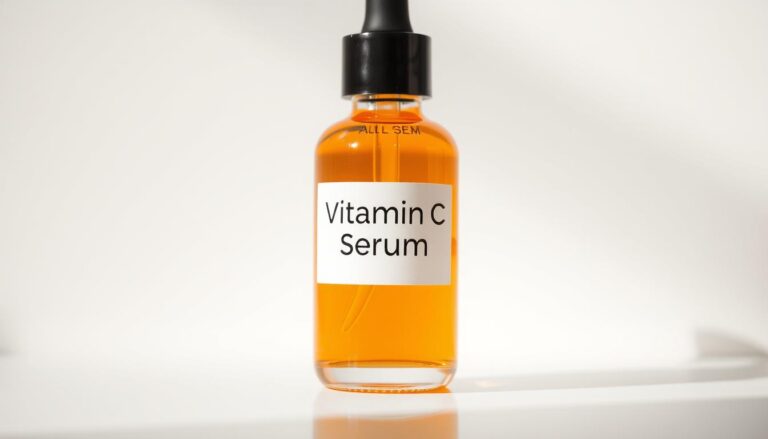Can Collagen Cause Acne? What Science Says
Many people wonder if collagen supplements can cause acne. More folks are using collagen to boost their skin health. But, some worry it might harm their skin instead.
Recent studies have raised questions about collagen intake and acne. If you’re thinking about adding collagen to your skincare, it’s key to know what science says.
The connection between collagen and acne is not simple. It involves many factors that affect our skin. By diving into this topic, you’ll learn about the latest research and what experts think.
Table of Contents
Understanding Collagen and Its Role in Skin Health
Collagen is a protein that greatly affects your skin’s health and look. It gives your skin structure and makes it elastic. Since it’s the most common protein in our bodies, it’s key to keeping our skin strong.
What Is Collagen?
Collagen is a protein that helps build tissues like skin, bones, and connective tissue. Its unique triple-helix shape makes it strong and durable.
The Different Types of Collagen
There are 28 types of collagen, each with its own job in the body. Type I collagen is the most common in skin. It helps keep skin strong, elastic, and firm.
- Type I Collagen: Found in skin, bones, and tendons, providing structural support.
- Type III Collagen: Often found in muscles, organs, and blood vessels, supporting their structure and function.
How Collagen Affects Your Skin
Collagen deeply impacts your skin’s health, affecting its hydration, elasticity, and look. As we age, our collagen production drops. This can cause wrinkles and less elastic skin.
Keeping collagen levels healthy is vital for tackling skincare concerns like dryness, sagging, and loss of firmness. Knowing how collagen affects skin health helps you choose better skincare. It might even help slow down some aging signs.
Can Collagen Cause Acne? The Direct Answer
Collagen is known for its benefits to skin health. But, its effect on acne is still debated. If you’re thinking about adding collagen supplements to your skincare, knowing how they might affect acne is key.
Common Claims About Collagen and Breakouts
Some people say they got more breakouts after taking collagen supplements. This makes them worry that collagen might make acne worse. But, anecdotal evidence is not conclusive. These stories are mostly based on personal experiences, not scientific proof.
What Scientific Research Shows
Scientific studies don’t strongly link collagen supplements to acne. In fact, some research shows collagen might help skin look better. It could make fine lines less noticeable and skin more elastic. More research is needed to really get how collagen and acne are connected.
Anecdotal Evidence vs. Clinical Studies
There’s a big difference between what people say and what science finds. While some might get more breakouts, clinical studies haven’t found a clear link between collagen supplements and acne. It’s important to look at both kinds of evidence when figuring out collagen’s effect on your skin.
In summary, there are mixed views on collagen and acne. But, science says we need more research to understand this fully. Always watch how your skin reacts and talk to a doctor if you have concerns.
The Science Behind Collagen and Skin Function
Collagen is key to keeping our skin healthy. But, its effect on acne is still being studied. To grasp how collagen might link to acne, we need to explore its role in skin health.
Collagen’s Impact on Skin Structure
Collagen is a major part of our skin, giving it strength and flexibility. It acts as a framework for skin cells, affecting its firmness and moisture. Having enough collagen is crucial for skin health. Any issues with collagen can cause skin problems.
How Your Body Processes Collagen Supplements
When you take collagen supplements, your body breaks them down into amino acids. These amino acids are then used for different body functions. How well your body absorbs collagen supplements can vary. This depends on your digestive health and other nutrients you have.
Collagen peptides are known to be easily absorbed by the body. This makes them useful for skin health and other functions.
Collagen Production and Hormonal Balance
Hormones play a big part in collagen production. Changes in hormones can slow down collagen making, affecting skin health. For example, hormonal shifts during menopause or pregnancy can change skin texture and make acne more likely.
It’s important to understand how hormones and collagen work together. This helps us see how collagen supplements might help with acne-prone skin.
By looking into the science of collagen and its effects on skin, we can learn more about its connection to acne. This knowledge helps us make smart choices about using collagen supplements.
Different Types of Collagen Supplements and Their Potential Effects
Choosing the right collagen supplement is key to its effectiveness and safety for your skin. There are many options out there. It’s important to know the differences to make a smart choice.
Collagen supplements come from various sources. Their quality and how well they work can depend on where they come from and how they’re made. You’ll find marine collagen, bovine collagen, collagen peptides, and more.
Marine Collagen
Marine collagen comes from fish and sea animals. It’s known for being easily absorbed by the body. It’s rich in Type I collagen, which is good for your skin. Marine collagen is said to make your skin more elastic and hydrated.
Bovine Collagen
Bovine collagen comes from cows. It has Types I and III collagen, which are great for your skin, hair, and nails. But, the quality can vary based on where it comes from and how it’s processed.

Collagen Peptides
Collagen peptides are short amino acid chains that your body can easily absorb. They’re used in many products, like supplements and skincare. Collagen peptides help boost collagen in your skin.
Other Collagen Formulations
There are also chicken collagen, porcine collagen, and recombinant collagen. Each has its own benefits. Your choice might depend on what you prefer, dietary needs, and specific skin issues.
Knowing about the different collagen supplements can help you pick the best one for your skin. Look at the source, quality, and how it’s made. This ensures you get a safe and effective product for your skin.
Factors That May Influence Collagen’s Effect on Your Skin
Your skin’s reaction to collagen supplements depends on many things. Collagen is often good for your skin, but its effect can change based on different factors.
Individual Skin Sensitivity
How your skin reacts to collagen supplements can vary. Some people might have adverse reactions because of sensitive skin. Others might not see any big changes.
Pre-existing Skin Conditions
Having skin conditions like acne, rosacea, or eczema can affect collagen’s impact. For example, if you have acne, watch how collagen supplements affect your skin.
| Skin Condition | Potential Effect of Collagen |
|---|---|
| Acne-prone skin | May improve skin elasticity, but could potentially exacerbate breakouts in some cases |
| Dry skin | May improve hydration and reduce appearance of fine lines |
| Sensitive skin | May cause adverse reactions in some individuals, necessitating careful monitoring |
Quality and Purity of Supplements
The quality and purity of collagen supplements matter a lot. Good-quality supplements are safer and more effective.
Additives and Fillers in Collagen Products
Some collagen products have additives or fillers that might irritate your skin. Always check the ingredients to make sure they’re right for you.
Knowing these factors helps you choose collagen supplements wisely. Always talk to a healthcare professional or dermatologist for advice that fits you.
The Relationship Between Collagen and Other Acne-Causing Factors
Collagen’s effect on acne isn’t just one thing. Hormonal changes and inflammation also play a part. Knowing how collagen supplements work with these factors is key to managing acne.
Collagen and Hormonal Fluctuations
Hormonal changes can really mess with your skin, leading to acne. Some studies say collagen supplements might help balance hormones. But it’s important to watch how your skin reacts when you start taking them, especially if you get hormonal acne.
Things to think about include:
- The type of collagen supplement you’re using
- Your individual hormonal sensitivity
- Any pre-existing hormonal imbalances
Digestive Health and Collagen Absorption
Your digestive health is crucial for collagen absorption. Poor digestion can mean your body doesn’t get the collagen it needs, leading to inflammation and acne. Eating well and taking probiotics can help your body use collagen better and avoid side effects.
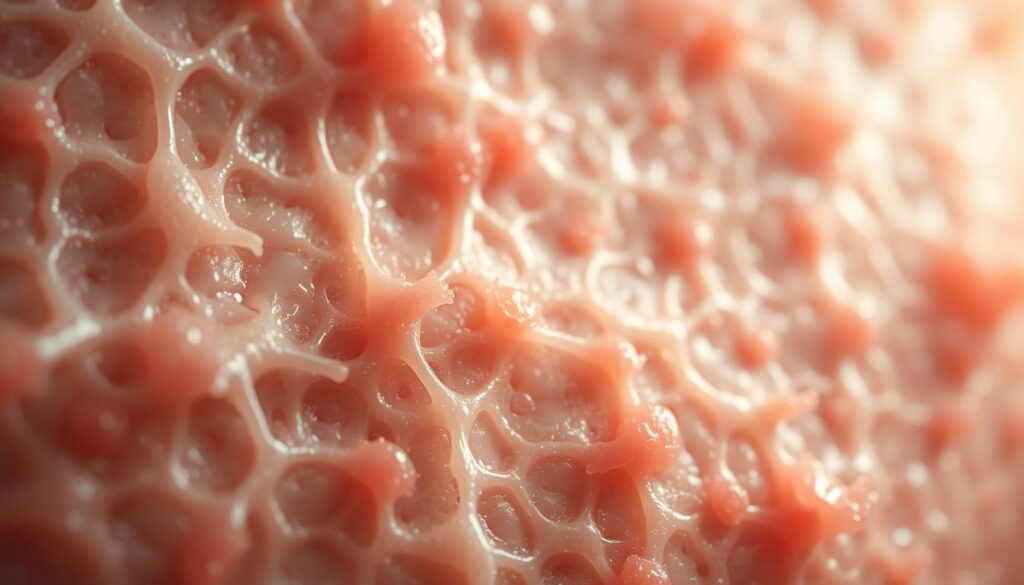
Inflammation Responses to Collagen
Inflammation is a big player in acne. Even though collagen is known for its anti-inflammatory effects, some people might still react to it. It’s important to watch how your body reacts and adjust your supplements as needed.
To avoid inflammation:
- Start with a small dose to test your tolerance
- Choose high-quality, pure collagen supplements
- Be aware of any additives or fillers in the product
Understanding how collagen, hormones, digestion, and inflammation work together can help you decide if collagen supplements are right for you, even if you have acne-prone skin.
Potential Benefits of Collagen for Acne-Prone Skin
Collagen’s effect on acne is still being studied. Yet, its healing properties are great for skin that easily gets acne. Adding collagen to your skincare might bring many benefits.
Healing and Repair Properties
Collagen helps in repairing and regenerating the skin. It can heal acne lesions and lessen the look of scars. This makes it a good choice for your skincare routine.
Anti-inflammatory Effects
Collagen also has anti-inflammatory properties. It can reduce acne’s redness and swelling. This leads to a more even skin tone and less acne.
Balancing Oil Production
Some research shows collagen can balance skin oil. For skin that produces too much oil, this is very helpful.
| Benefit | Description | Potential Impact on Acne-Prone Skin |
|---|---|---|
| Healing and Repair | Promotes skin regeneration and repair | Reduces appearance of acne scars |
| Anti-inflammatory Effects | Reduces redness and swelling | Lessens acne severity |
| Balancing Oil Production | Regulates skin’s natural oil | Reduces excessive oil, potentially lowering acne risk |
Knowing how collagen can help acne-prone skin helps you choose better skincare. You can decide if collagen supplements or products are right for you.
How to Use Collagen Safely If You Have Acne-Prone Skin
To safely use collagen supplements with acne-prone skin, you need to be informed and cautious. Collagen can be beneficial for skin health. But, it’s essential to navigate its use carefully when you have acne concerns.
Starting with Small Doses
Begin with a small dose to gauge your skin’s reaction. This approach allows you to assess any potential adverse effects before increasing your intake. Start low and go slow is a prudent strategy when introducing new supplements, especially if you’re concerned about collagen supplements acne concerns.
Choosing the Right Collagen Type
The type of collagen you choose can impact its effectiveness and your skin’s response. Marine collagen and collagen peptides are popular options due to their high bioavailability. Research the different types, such as bovine or marine collagen, to determine which might be best for your skin type.
Monitoring Your Skin’s Response
Keep a close eye on your skin’s reaction to collagen supplements. If you notice any adverse effects, such as increased breakouts or irritation, consider adjusting your dosage or consulting a dermatologist. Monitoring is key to understanding the collagen and acne relationship in your case.
When to Consult a Dermatologist
If you’re unsure about using collagen supplements or if you experience persistent or severe acne, consult a dermatologist. They can provide personalized advice based on your skin type and health history. This helps you make an informed decision about incorporating collagen into your skincare routine.
By being cautious and informed, you can harness the potential benefits of collagen while minimizing risks associated with acne-prone skin.
Conclusion: Making an Informed Decision About Collagen
You now know how collagen affects your skin, especially if you get acne. The link between collagen supplements and acne is complex. It depends on your skin sensitivity, the quality of the supplements, and your skin health.
When thinking about collagen for your skin, consider the good and the bad. Studies show collagen can improve your skin’s hydration and elasticity. This might help with acne issues.
To make a smart choice, know that collagen might not cause acne often, but it’s possible. Choose top-notch collagen products, start with a small dose, and watch how your skin reacts. This way, you can avoid any bad effects.
Whether to use collagen supplements is up to you and your skin. Knowing how collagen can affect your skin helps you decide. You can choose what’s best for your skin, addressing concerns about collagen and acne.
